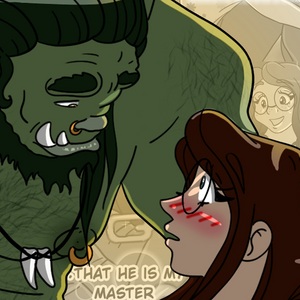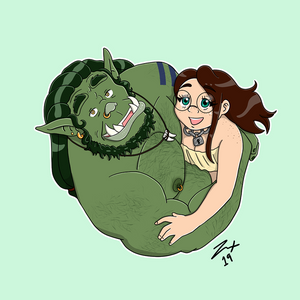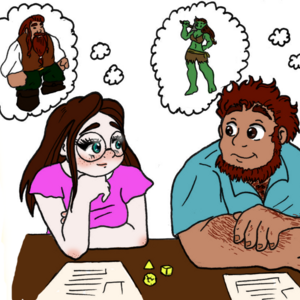My “break up speech,” heavily edited and in its fifth draft, had to be written on paper, and practiced several times before I recited it to Bill. It was fortunate that I had memorized it by this point, as the paper shook so badly in my hands that I could barely read it. That sheet of lined notebook paper had more spine than me. To be fair, Bill didn’t exactly handle the break-up with grace either.
I couldn’t really blame him. In our four years together I’d accomplished little more than breaking his heart, and I didn’t even do that very well. If I was going to cut things off I could have at least done it with confidence, but that was something that brave people did. That’s what Glasha would have done.
We’d disappointed each other, really. Bill was not the long-haired, heavy-shouldered, charismatic musician, standing proudly before life like a bardic Thorin Oakenshield. Nor was I a puissant, adventurous, Amazonian warrior woman. Bill was not Modin anymore than I was Glasha. We weren’t capable of making one another happy, so it was best that we ended it.
However on dreary nights like this, when even my fluffy cotton sheets still felt cold, it was difficult to remind myself of this fact. I had offered him the apartment when we split, even though it had been mine before he’d moved in. Taking on the burden of moving out seemed the polite thing to do. Although I knew he wouldn’t accept it even before he replied a flat, tear-logged “no.”
Keeping the apartment wasn’t exactly a blessing. Bill did not elaborate on why he didn’t want it, but his reasoning was clear: he had no use for a place that would only remind him of me –of us. But I did not realize this until I came home from work on a Thursday night, two weeks later, to furniture imprints in the carpet, clear patches in otherwise dusty shelves, and spots on the walls left unbleached by the sun. Shadows of his existence.
It took a few weeks, but the carpet did fluff back into its original shape. I dusted off the shelves, and watched as the sun slowly faded the walls to a uniform color. Even now traces of him still lingered, nestled in corners, less-used kitchen drawers, and sometimes the hallway closet. I often discovered them with nipped fingers, and would recoil in both pain and surprise. It took about 6 months, a completely redecorated bathroom, and a number of empty wine bottles, but I managed to make the apartment mine, not ours, again.
During the first three months after our break-up, I’d thought about moving out. Maybe I’d find someplace that would let me have a cat. The rent wasn’t bad here, but there might be cheaper places. Did I really need two bedrooms? Did I really need to stay in a place filled with memories of him?
I loved this apartment, though. I loved the old-fashioned flower boxes outside my bedroom window where birds sometimes nested in the spring. I loved the crooked doors to the bathroom and the closets that left weird gaps in the frame. I loved its dated avocado green kitchen tiles, and the slanted wooden floor in the hallway. This apartment, like me, existed as something flawed, eclectic and trying desperately to exist without Bill’s presence. That was why I stayed.
We often hear the broken-hearted rhetoric of the person who was left, but rarely do we listen to the person who initiated the break-up. I suppose that’s because the former is typically seen as the victim, while the latter is labelled the villain. A large portion of contemporary fiction, and non-fiction, is dedicated to the story of the victim’s struggle with post-break-up depression, and how they rise above it to rediscover themselves. Many of these stories conclude with an ironic twist of fate in which the protagonist runs into their former lover only to find that he or she has aged poorly, and suffered a slew of unhappy relationships, among other unfortunate events, and the main character experiences contradictory feelings of both satisfaction and pity.
The “victim” gets the obligatory, and understandable, comfort of those around him or her. Victims get the pints of Ben & Jerry’s, a few extra drinks at the bar, and shoulders to cry on. The villain however gets a reassuring pat on the shoulder, and the promises of “this doesn’t affect our friendship with you” and “we’ll still hang out with you,” that most people never keep.
That’s the price one pays for choosing to be the villain though. No one wants to hear the villain’s story. No one wants to know about the villain’s feelings of guilt. No one believes the villain had justifiable reason. No one notices how sometimes the victim chooses to be such, while the villain has no choice at all. Well there was one thing I had a choice about. I didn’t need to choose another man’s arms as comfort…
I turned over on my side, away from the papers littering my bedroom floor, and covered my head with my pillow. In times of stress I often liked to tuck myself beneath, or behind things. Little nooks, corners, and any other “in-between” places. There was a rotating cabinet in my parent’s home, beneath the kitchen counter just big enough for a four-year-old. This had been my favorite spot up until I became too big to fit inside. As an adult I enjoyed a tiny, worn-out desk on the third floor of the library; it was positioned near a window and behind musty, reference volumes not likely touched in at least a year. I liked to sit there for hours writing, and occasionally running my fingertips over the hastily etched names and numbers of its previous occupants.
In-between places felt secure to me. Little pockets in reality that could temporarily shield me from the outside world. Shrouding myself in the opaque green curtain of my pillow case I felt the images of things I didn’t want to remember fade away. I extended my arms letting a tired stretch course through my shoulders. My fingertips reached the copy of “The Viking Captive” laying, pages down, on my comforter. I could just see its manipulated stock-photo cover from my pillow case hiding spot.
The books, the video games, the movies, the comics, the TV shows I liked –they weren’t any different from my in-between places. Figurative, or literal, they were small spaces where I liked to sequester myself. Lying there in the yellow glow of my bedside lamp, I began to wonder if my episodes were nothing more than my sanity progressively slipping into a permanent in-between place… With an exasperated groan I tossed my pillow aside, and turned off my bedside lamp. I decided that was enough trips down memory lane for one night.
I repositioned my pillow, and gave it a necessary fluffing before plopping back onto it. My room was dark now, save for the light of the streetlamps sneaking between the blinds. The dim light illuminated bits of the posters on my walls: letters, logos, pairs of eyes. Like an abstract art piece I stared at it, trying to interpret meaning and patterns where there clearly weren’t any, as my eyelids grew heavy.












Comments (2)
See all